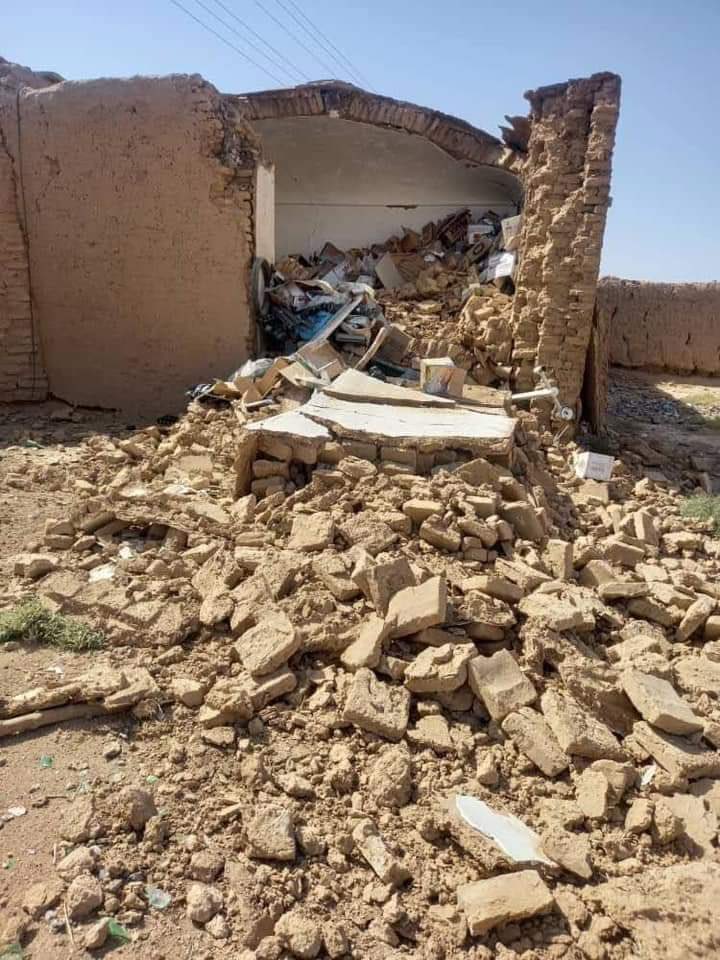An ariel view of the destruction Photo: Twitter/ @MJalal0093
Afghanistan – More than 2 000 people have died after a devastating earthquake, measuring 6.3 in magnitude, struck Western Afghanistan on Saturday morning. According to Taliban spokesman Zabihullah Mojahid, the death toll has climbed to a staggering 2 445 people, with over 1 240 individuals injured, and at least 1 320 houses either completely or partially destroyed. The quake hit Zindajan, a rural district some 40 kilometres west of Herat city making it the third-largest earthquake to strike Afghanistan.
The quake impacted 15 villages in Zindajan and was also felt in neighbouring provinces of Badghis and Farah. According to Dr M Haroon Khatibi, Chairman at Humanitarian Assistance Society, of those 15 villages three have been “completely destroyed”. The only survivors are those who weren’t at home during the earthquake.
This is the second earthquake that has struck Afghanistan. Back in March, a deadly quake struck northeastern Afghanistan, sending residents fleeing from their homes as it brought down entire buildings and triggered devastating landslides.
The humanitarian crisis
The affected area faces severe challenges in the aftermath of the disaster. With limited infrastructure, the region struggles to receive aid promptly. Local NGOs and the Afghan government are doing their best, but their resources are stretched thin. The head of the Taliban political office in Qatar, Suhail Shaheen, has said that Afghanistan needs food, drinking water, medicine, clothes and tents urgently for rescue and relief. Several aid agencies have dispatched help, including the Afghan Red Cross Society, MSF, World Food Programme and Unicef. Few countries have pledged money since Saturday’s quake. China’s Red Cross Society has offered $200,000 (£164,220) in emergency cash aid, Chinese media reported.
Rashid Khan, Afghanistan cricket player, has also pledged to donate all of his Cricket World Cup 2023 match fees to help those affected. His foundation, Rashid Khan Foundation, is also organising an urgent fundraising campaign to aid the victims and to provide immediate relief.
“We have got some promises of help from the neighbouring countries and from Turkey but on the ground there are still only local NGOs and the local government which is unfortunate. The situation in Afghanistan, the government doesn’t have enough things to help the people. The people are there [helping to search for survivors] but they only have a spade or using their hands which doesn’t help. They only have primitive tools.”

A house destroyed by the earthquake Photo: @rashidkhan_19
Ill-equipped hospitals have been struggling to accommodate the injured. Many of them were sent to the Herat Regional Hospital, where teams from the medical charity Médecins Sans Frontières (MSF) have been since Saturday.The United Nations migration agency said it has deployed four ambulances with doctors and psychosocial support counsellors to the regional hospital. At least three mobile health teams are on their way.
The World Health Organization (WHO) unit in Afghanistan said it dispatched 12 ambulances to shift wounded people to hospitals. Meanwhile, Doctors Without Borders set up five medical tents at Herat Regional Hospital to accommodate up to 80 patients. Authorities have treated more than 300 patients, according to the agency. However, medical care might cripple further as in August, a spokesperson for the International Committee of the Red Cross said it was likely to end its financial support for 25 Afghan hospitals because of funding constraints.
SMread: Palestine resists: Gaza under fire, more than 1000 dead
Rebuilding Afghanistan after the earthquake
Afghanistan is prone to frequent earthquakes, particularly in the Hindu Kush mountain range, due to its proximity to the Eurasian and Indian tectonic plates. The nation, beset by long-standing conflicts and economic struggles, ranks among the poorest in Asia. Responding to natural disasters has become even more challenging since the Taliban assumed control in 2021, after the tumultuous US withdrawal, leading to the departure of numerous international aid organisations and hindering the country’s disaster response capabilities.
When the Taliban took over, the United States froze about $7 billion of the country’s foreign reserves and cut off international funding. The situation has crippled an economy already heavily dependent on aid. The urgency to rebuild clashes with the scarcity of resources. Political agendas continue to obstruct the swift return of this crucial fund, hampering the nation’s ability to expedite recovery efforts.
“That money will help a lot. The reserve bank’s assets are frozen in America and Europe. That would help a lot. The banks don’t function properly in Afghanistan. If that money was released, interbank functions would be easy for Afghanistan. That would help the economy which is unfortunately [crippling]. We are living in a very bad situation economically. Poverty is growing in Afghanistan. That money belongs to the people of Afghanistan. It doesn’t belong to any regime. That money belongs to Afghan people so America and Europe should release money. There are many good projects that Afghanistan can do [with that money].”
According to WHO search and rescue operations remain ongoing in the area.
